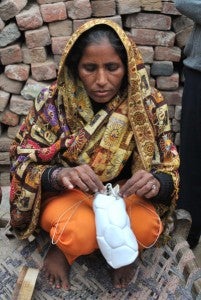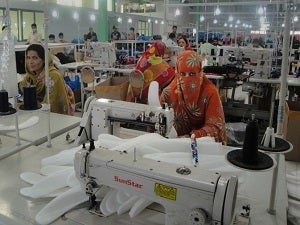Recognition and protection for Pakistan’s home-based workers
Date:
Five years ago, the death of Shahida Parveen's husband left her facing a frightening future. Unsure how best to support herself and her four children, she began to stitch footballs at her home in the small rural village of Mehat Pur, in Pakistan's Punjab Province. The work was unstable, unregulated, and her monthly income (approximately Rs. 2,500 or US$27.98) didn't meet the rising price of food. She started to borrow money for groceries and the tuition of her children, leaving her in debt and vulnerable to exploitation.

Shahida's situation is far from unique. Pakistan's 11.6 million or so female home-based workers make up a large chunk of its informal work force. These women face a multitude of challenges, many rooted in gender discrimination. With their mobility often restricted, along with their education and skills training; less access to, or ownership of resources and assets, or access to credit and social services, such women have few opportunities to advance. Meanwhile, the lack of women's involvement in decision-making - at home and in the public realm - secures their low social and economic status across the country.
As part of its work to economically empower Pakistan's female home-based workers, UN Women is helping them move into formal and decent employment. Its programmes raise the women's awareness of their rights to, for example, healthy, safe and improved working conditions such as free transport, separate resting areas and washrooms, as well as equal wages and the right to join unions and bargain collectively. This has allowed many women to better lobby for registration, greater recognition and protection in the workforce.
One programme for example, run with the with the International Labour Organization (ILO), designed a comprehensive support package on decent work deficits. It drew from the ILO's Home Work Convention (No. 177) and a draft national policy on home-based workers, to incorporate trainings on rights, business diversification, conventions and labor law standards, organizing and collective bargaining.
When Baidarie, a UN Women partnering NGO, visited Mehat Pur in 2010, Shahida was one of 100 women trained on the legal rights of formal workers. With support from Baidarie, she enrolled in a four-month training programme at the nearby Leather Products Development Institute.

The training helped her get a factory job that pays almost three times her original salary, with health facilities, and health and security benefits. Meanwhile, the NGO loaned Shahida's son the money to set up a barber shop in their village, as part of its Micro Credit Program. As the collective income of Shahida's home has soared, she says, so has her confidence in herself, and the future of her family.